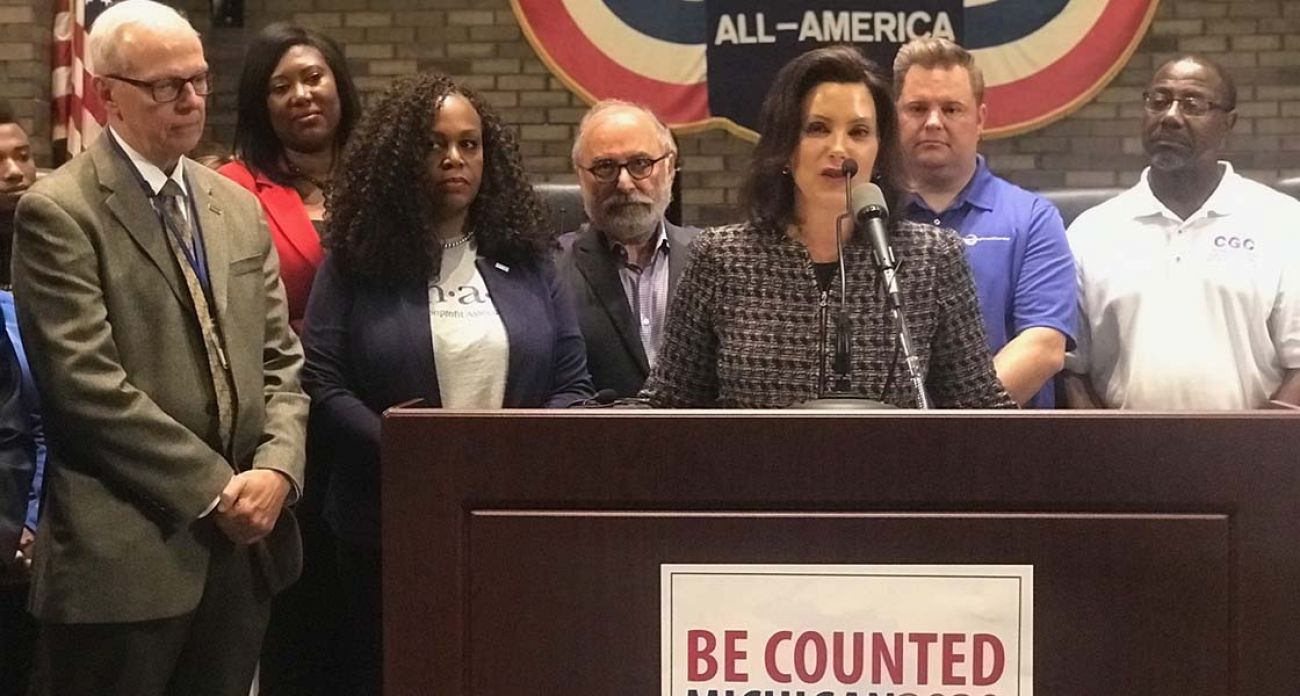Gretchen Whitmer on Census: Get counted or lose money, clout for Michigan

Gov. Gretchen Whitmer on Tuesday announced that she is creating a committee to ensure that everyone in Michigan is counted during the 2020 census.
And her message was stark: Michigan cannot afford to lose federal aid or a congressional seat due to an undercount.
Whitmer signed an executive order creating the Complete Count Committee in Michigan, a group of at least 63 appointees who will work with the Michigan Department of Technology, Management and Budget to ensure all residents fill out the U.S. Census documents next year. The effort will include ethnic, nonprofit, business and community groups that will reach out to neighborhoods that are so-called “hard to count” or “hard to reach” such as poor, rural and immigrant communities, she said.
“Every community will be represented in this effort,” Whitmer told officials and residents at a news conference in Southfield. “Raising awareness is the first important work we need to do together.”
U.S. Census population count is tied directly to about $675 billion in 16 federal aid programs that go to states for services such as Medicare and Medicaid health coverage, food stamps, infrastructure, foster care, preschool and school lunch programs.
The population count also determines the number of U.S. Congressional representatives each state gets.
Every 10 years, following the U.S. Census, states, counties and municipalities have to redraw political boundaries to balance population. If Michigan’s population decreases too far below the 9.8 million population count in 2010, or is smaller compared to other states, Michigan could also lose one of the current 14 elected seats in the U.S. Congress.
“The prospects of an undercount, of perhaps losing a member of Congress, I think that’s what’s most important,” Whitmer said.
Related:
- Detroit serious about boosting Census participation, Mayor Mike Duggan says
- Gerrymandering in Michigan
The City of Detroit, which announced its own Census informational effort this spring, knows well the financial costs of low Census participation. The city in 2010 had a participation rate of about 64 percent, the lowest of any rate among major cities in the country.
That cost the city about $1,800 per person per year in federal aid, said Alexis Wiley, the chief of staff for Mayor Mike Duggan.
The biggest challenge facing the state committee will be to get undocumented immigrants or citizens who fear or do not trust the ways in which the information will be used to respond to the Census, officials said.
“We cannot fear to stop us from saying we are here in our communities,” Wiley said.
Hassan Jaber, president and CEO of ACCESS, a Dearborn-based nonprofit organization that provides about 120 community services focused on Arab-American communities, said fear, government distrust and Internet access are among the challenges the committee will face in its outreach effort.
The Census can be completed online, but in some rural parts of Michigan in 2017 more than 35 percent of residents had no Internet access and in Detroit about 45 percent of households had no Internet.
Also, the 2020 Census plans to ask residents about their citizenship status, a question that has raised fears among some immigrant communities. The U.S. Supreme Court is expected in June to decide whether it is legal to include the question.
“All of this makes the 2020 Census a challenge for us,” Haber said. “This is a civic duty. We cannot have less representation and less resources as a result of not doing a good job, a full job, a complete job,” he said of the Census.
Hayg Oshagan, founder and director of New Michigan Media, a group of Michigan ethnic media outlets, said residents need to hear from trusted organizations and leaders that they will not suffer legal consequences by responding to the Census.
“It requires that a trusted voice tells them to participate,” he said. “We’re trying to manage this kind of campaign across the state.”
Kurt Metzger, a demographer and mayor of Pleasant Ridge, said the most important part that state government can play is to allocate funds to the Census effort to help mobilize governmental entities and nonprofits statewide.
“People listen to folks they trust - nonprofit service providers, schools, childcare providers, their hairdressers and barbers,” Metzger wrote in an email to Bridge.
“Efforts focused on these groups need monetary support from state government.”
Whitmer’s announcement did not include a budget for the committee.
The 2020 U.S. Census Complete Count Committee will include the governor, Lt. Gov. Garlin Gilchrist, two state senators, two representatives from the Michigan House of Representatives, and officials from nonprofits and community groups such as the Michigan Nonprofit Association, Council of Michigan Foundations, AARP, NAACP, Michigan Chamber of Commerce and unions.
See what new members are saying about why they donated to Bridge Michigan:
- “In order for this information to be accurate and unbiased it must be underwritten by its readers, not by special interests.” - Larry S.
- “Not many other media sources report on the topics Bridge does.” - Susan B.
- “Your journalism is outstanding and rare these days.” - Mark S.
If you want to ensure the future of nonpartisan, nonprofit Michigan journalism, please become a member today. You, too, will be asked why you donated and maybe we'll feature your quote next time!




